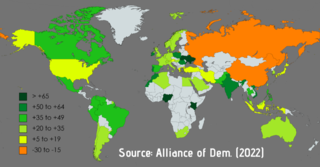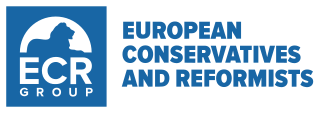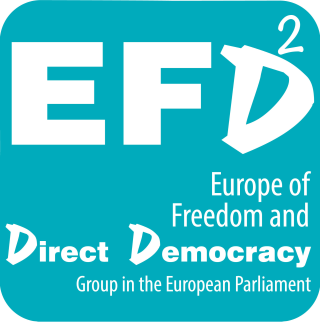
Euroscepticism, also spelled as Euroskepticism or EU-scepticism, is a political position involving criticism of the European Union (EU) and European integration. It ranges from those who oppose some EU institutions and policies, and seek reform, to those who oppose EU membership and see the EU as unreformable. The opposite of Euroscepticism is known as pro-Europeanism, or European Unionism.

Pro-Europeanism, sometimes called European Unionism, is a political position that favours European integration and membership of the European Union (EU).

The League of Polish Families is a social conservative political party in Poland, with many far-right elements in the past. The party's original ideology was that of the National Democracy movement which was headed by Roman Dmowski, however, in 2006 its leader Roman Giertych distanced himself from that heritage.

Independence/Democracy (IND/DEM) was a Eurosceptic political group that operated in the European Parliament between 2004 and 2009. At its height in 2004, it had 37 MEPs and it only existed during the European Parliament's 6th term. It was affiliated with the Eurosceptic Europeans United for Democracy party.

The European Democratic Party, also known as the European Democrats, is a centrist European political party in favour of European integration.

The political groups of the European Parliament are the officially recognised parliamentary groups consisting of legislators of aligned ideologies in the European Parliament.

Euroscepticism in the United Kingdom is a continuum of belief ranging from the opposition to certain political policies of the European Union to the complete opposition to the United Kingdom’s membership of the European Union. It has been a significant element in the politics of the United Kingdom (UK). A 2009 Eurobarometer survey of EU citizens showed support for membership of the EU was lowest in the United Kingdom, alongside Latvia and Hungary.

Europeans United for Democracy – Alliance for a Europe of Democracies, formerly known as EUDemocrats, was a Eurosceptic and self-described Eurorealist alliance of parties and movements from 15 European countries. It operated as a transnational party at the European level, according to Regulation (EC) No 2004/2003. It sought a radical decentralization or a complete abolition of the EU. It incorporated members from both the right and the left political spectrum; however, it was dominated by left-wing parties and represented ideologically left-wing faction of Euroscepticism. It functioned between 2005 and 2017.
European nationalism is a form of pan-nationalism based on a pan-European identity. It is considered minor since the National Party of Europe disintegrated in the 1970s.

Svobodní is a classic liberal and right-libertarian, Eurosceptic political party in the Czech Republic founded in 2009 by Petr Mach, an economist and professor of macroeconomics. Before assuming his position as an MEP, Mach taught economics at VŠFS and VŠEM. The party is led by Libor Vondráček.

Europe of Freedom and Democracy (EFD) was a far-right, Eurosceptic political group that operated in the European Parliament from 2009 to 2014. It was composed of 34 MEPs and it existed during the European Parliament's 7th and 8th terms. After 2011, EFD had a loose relationship with the Movement for a Europe of Liberties and Democracy political party.

The European Conservatives and Reformists (ECR) is a soft Eurosceptic, anti-federalist political group of the European Parliament. The ECR is the parliamentary group of the European Conservatives and Reformists Party European political party, but also includes MEPs from other European parties and MEPs without European party affiliation.

The European Conservatives and Reformists Party, formerly known as Alliance of European Conservatives and Reformists and Alliance of Conservatives and Reformists in Europe, is a conservative, soft Eurosceptic European political party with a main focus on reforming the European Union (EU) on the basis of Eurorealism, as opposed to total rejection of the EU (anti-EU-ism).
The European Alliance for Freedom (EAF) was a pan-European political party of right-wing Eurosceptics. It was founded in late 2010, the party was recognised by the European Parliament in 2011. It did not seek registration as a political party with the new Authority for European Political Parties and European Political Foundations in 2016 and was dissolved in the following.

Europe of Freedom and Direct Democracy was a Eurosceptic and populist political group in the European Parliament. The EFDD group was a continuation for the Eighth European Parliament of the Europe of Freedom and Democracy (EFD) group that existed during the Seventh European Parliament, with significant changes to group membership.

The Alliance for Direct Democracy in Europe, abbreviated to ADDE, was a European political party founded in 2014. It was composed of parties belonging to the Europe of Freedom and Direct Democracy (EFDD) group in the European Parliament (EP). The dominant national party in the ADDE was the UK Independence Party (UKIP), providing 21 of the party's 27 members of the European Parliament (MEPs) elected in 2014. A further three UKIP MEPs chose not to participate in the ADDE. In 2015, the ADDE was recognised by the European Parliament and its grant maximum from the EP was set at €1,241,725, with an additional €730,053 for its affiliated political foundation, the Initiative for Direct Democracy. ADDE was closed down in 2016 after an auditors' inquiry found misspending of EU funds. The party was legally dissolved on 24 May 2017.
Freedom and Direct Democracy is a political party in the Czech Republic. It is led by Tomio Okamura and it holds 20 seats in the Chamber of Deputies.
Euroscepticism, i.e. the opposition to policies of supranational European Union institutions and/or opposition to membership of the European Union, is a significant element in the politics of the Czech Republic, with several parties and political figures favouring leaving the union. According to a survey by CVVM in April 2016, 25% of Czechs were satisfied with European Union membership.

Laure Ferrari is a French politician who has worked for several right-wing to far-right political organizations and parties, including the French nationalist party Debout la France.














